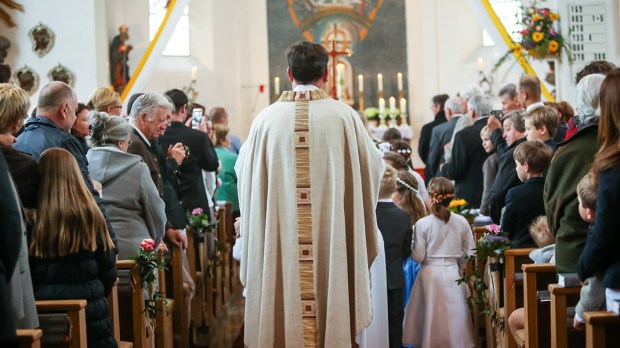At the very beginning of Mass, Catholics make a type of confession of sins, declaring their faults before the whole congregation. Afterward, the priest recites a formula that appears to absolve their sins at Mass.
The priest typically says the following words.
May almighty God have mercy on us, forgive us our sins and bring us to everlasting life.
What can be confusing is that sometimes particular priests or the people in the pews will make the sign of the cross, as if they were in the confessional.
While the opening rites of Mass may mimic some of the acts of confession, in reality this is far from any type of “general confession” or “general absolution.”
The General Instruction of the Roman Missal clearly states this distinction.
After this, the Priest calls upon the whole community to take part in the Penitential Act, which, after a brief pause for silence, it does by means of a formula of general confession. The rite concludes with the Priest’s absolution, which, however, lacks the efficacy of the Sacrament of Penance. (GIRM, 51)
A sign of the cross is not present in the Roman Missal and so is not prescribed as a way to conclude this Penitential Rite.
It’s important to note that the priest’s words are a “petition” for forgiveness and not a “declaration” that our sins are forgiven.
The sacrament of confession is the Church’s ordinary way of granting absolution.
In a valid confession, the priest declares that our sins are absolved. “I absolve you” is part of the necessary words of the sacrament. The word itself indicates what is happening. Absolve is from Latin absolvere ‘set free, acquit’, from ab- ‘from’ + solvere ‘loosen.’
So in confession, we are set free, and our sin no longer has us in bondage.
Communion
At the same time, it should be noted that if we are in a state of grace and able to receive Communion, then venial sins will be wiped free with our reception of the Body and Blood of Christ. This is because, as the Catechism explains, the intimate communion with Christ in the Eucharist necessarily cleanses us.
1393Holy Communion separates us from sin. The body of Christ we receive in Holy Communion is “given up for us,” and the blood we drink “shed for the many for the forgiveness of sins.” For this reason the Eucharist cannot unite us to Christ without at the same time cleansing us from past sins and preserving us from future sins.



